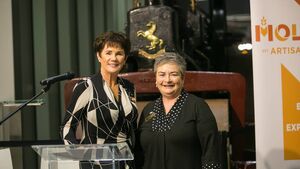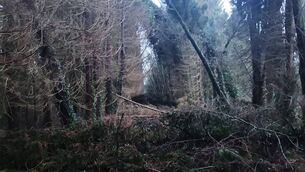Fallon's Town Talk: Roscommon Drama Festival moves to centre stage

Pictured at the launch of the Roscommon Drama Festival were Mairead Nally, Chairperson Roscommon Drama Festival and Mary Finn, commitee member. Pic. Michelle Hughes Walsh
“March brings breezes loud and shrill/stirs the dancing daffodil." The lines from the poem ‘The Months’ by Sara Coleridge will resonate this week. However, in Roscommon Town, March brings the Drama Festival as the cream of the country’s amateur drama groups converge on Roscommon Arts Centre for a celebration of the theatre.
The famous symbol of drama, the twin faces of comedy and tragedy, are up around the town with the distinctly Roscommon twist of being in the county’s yellow and blue colours. Like so many other aspects of Irish life, Covid-19 could have wreaked havoc with amateur drama, but the thespian community is renowned for its resilience and the circuit seems to be as buoyant as ever. The season will climax in Athlone at the All-Ireland Drama Festival but until Saturday, March 9th, it’s Roscommon that will take centre-stage.
Over the years, it has been noticeable how many groups return to Roscommon. This mix of old friends and new faces is the heart of the festival’s ongoing popularity. For instance, the Holycross/Ballycahill Drama Group from Tipperary have been regular visitors and it is they who will open the festival next Friday night with a production of Brian Friel’s ‘Dancing at Lughnasa’. Of course, the play was also made into a film starring, among others, Meryl Streep. It must be a daunting challenge for any director and cast to take on such a famous play and try to imbue it with their own interpretation and give it freshness. The amateur drama groups appear to relish that challenge.
The Glenamaddy Players and Kilmuckridge Drama Group from Wexford are other familiar names who will make a welcome return to Roscommon. The Newtownstewart Theatre Company from Tyrone is a new name to me, but their presence adds to the geographical spread of visitors. Works by Arthur Miller and George Orwell also feature with Orwell’s renowned novel ‘Animal Farm’ being adapted for the stage by Phoenix Players.
The Ray Leonard Players’s production of ‘Eclipsed’, which is set in a Magdalene Laundry, deals with an issue that continues to resonate powerfully through Irish society. There isn’t any play by John B. Keane, whose works were, for so long, a mainstay for amateur drama groups. It isn’t that Keane has gone out of fashion, it’s probably a case that tastes have broadened. Anyway, best wishes to all the visiting acting troupes and to the organisers. Hopefully, it will be a festival to remember.
The death of John Kerrigan marks the end of an era in Roscommon Town. John loved Roscommon Town, its history and its characters; becoming, in the process, one of the town’s best-known and most popular figures himself. John had an encyclopaedic knowledge of Roscommon’s past, be it recent or distant. He dedicated so much of his life to preserving that history and passing it on to future generations, The DVD ‘Walking Tours of Roscommon Town’ will maintain his legacy as will the innumerable articles he wrote over the years for the local newspapers. So too will the fond memories of all the people, young and old, visitor and local alike, that he met, helped and brought on tours.
A special memory I have of John is when I interviewed him in the summer of 2014 for a spread in the ‘Roscommon Herald’ about World War 1 in Roscommon Town. As usual, John was only too ready to help.
The article was published in August to coincide with the centenary of the outbreak of World War 1. The Irish attitude to The Great War had changed in the previous decade and the nation was ready to acknowledge its significance to our history.
The decade of centenaries came at a good time for a reappraisal of Ireland and World War 1 and John was able to give a local perspective. As usual, he provided comprehensive background about the era, including why local men chose to fight in the war. Their actions were often determined by economic as much as political reasons. John rang me later to express his delight with the article. When John said something was "bloody good", you knew he was pleased indeed.
At times like these, we all strive to remember the last time we met someone. It’s been a while since I was chatting to John. I didn’t realise he was ill but has missed his inimitable presence and distinctive voice around the town. As well as being a stellar custodian of Roscommon’s past, John Kerrigan was a lovely man. May he rest in peace.





